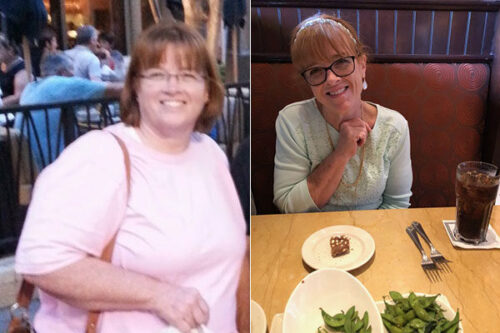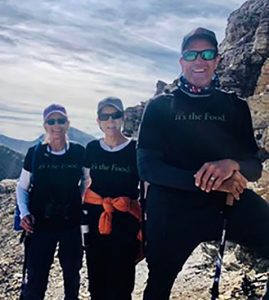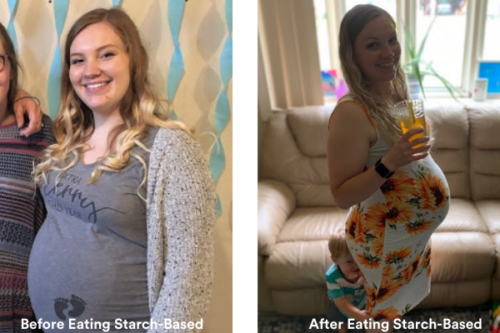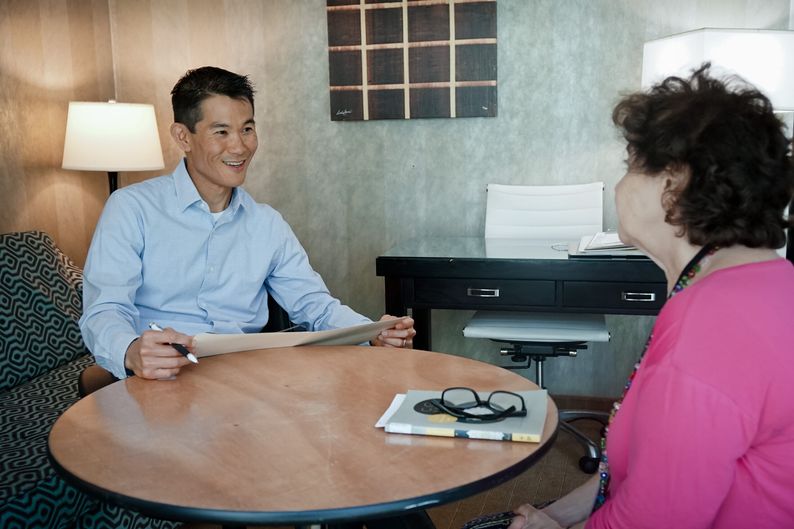Howard Bartner: Coronary Heart Disease, Hypertension
 I am 72 years old and retired in 2000 as Chief of Medical Illustration for the National Institutes of Health, after 42 years of service. As a graduate of the medical and biological program of the Johns Hopkins School of Medicine, I hold an appointment as Associate Professor, where I teach part-time.
I am 72 years old and retired in 2000 as Chief of Medical Illustration for the National Institutes of Health, after 42 years of service. As a graduate of the medical and biological program of the Johns Hopkins School of Medicine, I hold an appointment as Associate Professor, where I teach part-time.
My health was OK until 1997 when I started experiencing shortness of breath and had to slow down when walking – I was not overweight. I noticed after 10 minutes on my stationary bicycle I started having what seemed like indigestion. My cardiologist didn’t believe me when I told him I thought I had a heart problem, because he had done a Treadmill Stress Test (TST) on me a year earlier and that one was normal. Finally, I was so worried that I placed myself in the emergency room of the local hospital. When the cardiologist saw me in the hospital he accused me of being a hypochondriac; his attitude changed after my next TST.
“Bartner,” the doctor performing the TST barked, “you have coronary heart disease (CHD)! Now get off the treadmill and let’s get you set-up for the thallium scan!”
Interestingly, that same treadmill test showed no signs of CHD a year earlier. Could they be in error? How could this be happening to me? Unlike my family and close colleagues, I thought I had been doing things right, restricting myself to “healthy foods” and exercising when I could. I was in complete denial. My weight was pretty good, occasionally a friend reminded me to ‘suck in my gut’ and throw my shoulders back. “See how much better you look.” My blood pressure was 144/90 and could go higher, but was controlled with a combination of medications. “Whatever you’re doing, Howard, keep it up,” my cardiologist encouraged me.
My lipid profile was not a great concern to my cardiologist. Total cholesterol was in the desirable range – a little less than 200. Triglycerides were so high my doctor ignored the numbers; they bounced all over the place anyway. He told me that I could raise my HDL by taking niacin and that the LDL would go down in time. “Let’s not obsess, Howard, your present diet with exercise and medications should keep you in good shape.” He was being contrary. These remarks were coming from a doctor who was following the Atkins diet and really didn’t look as well as I did if you were measuring his waist line. I was left to my own means to save myself.
So why all of a sudden did I need an angioplasty? I thought I had been doing so well. What could I possibly be doing to harm myself? How could I take control of my own health? Was the problem with my “good diet?” I thought my food choices were an improvement over the typical American diet. I ate no red meat – stayed away from the fast food places. I did eat chicken, but not before removing skin and all visible fat. Fish was my best and favorite meal. All great sources of protein for building muscle. Downed at least 2 glasses of low-fat milk daily – good source of calcium for strong bones and teeth. My cardiologist encouraged me to use olive oil, telling me it was great for the heart. Oh, yes, no ice cream – only frozen non-fat yogurt.
My family and friends could not believe that I needed an angioplasty (2 stents). My cardiologist reminded me that I was no spring chicken – however he assured me that I would be up and running in no time. I remember feeling down and discouraged after my wife got me home with 2 stents inserted in my coronary arteries. Why wasn’t I jumping with joy? I would lie in bed and feel so terrible. My post angioplasty TST suggested that my stents didn’t close down – that was good news.
My cardiologist put me on any combination of drugs he could think of to control my blood pressure. He told me I was going to be on these for life. One medication, the beta blocker, made me depressed. The Hyzaar would swell my ankles and the diuretics had me up and to the bathroom all night long and I couldn’t even drive to work without stopping several times to urinate. The doctor tried ACE inhibitors and calcium channel blockers. This was a “medication changing” game – This one works, this one doesn’t, this one causes too many side effects, let’s try this one – switching one medication for another, but never willing to stop any of them. Finally, I told my doctor this wasn’t doing anything. I tried going without the medications and noticed no difference in my blood pressure when I took the drugs and when I didn’t. But, as soon as I stopped one drug, the doctor would be right there to start me on another one.
By chance, a friend and fellow illustrator from work dropped by to cheer me up. She asked me if I had ever heard of Dr. John McDougall, author of the McDougall Program – 12 Days to Dynamic Health. She and her husband were trying to follow the program but were not committed yet. I thanked her for the book; little did I know in that moment my health was to change dramatically for the better. The book quickly became my bible. I read it from cover to cover in one evening and found it fascinating and at the same time challenging and even a little scary. There is always the fear that if you stop eating animal products you’re going to die of protein deficiency. I told my wife that I wanted to try the program for a month to see if it did anything for me. She supported me but she could not commit herself at that time, so I was on my own.
After two weeks I noticed I had lost 3 pounds, had more energy, and enjoyed a feeling of well-being. I was excited about sharing my positive experiences with family, friends, and my cardiologist. Alas, the response I had expected, or hoped for, didn’t occur. No way! Not following a starch-based diet. Carbs make you fat; where do you get your protein? The calcium? More of these common questions were thrown at me.
My cardiologist warned me that the diet would cause my triglycerides to go off the charts. Discouragement from my cardiologist and friends made it easier for me to make my decision to follow the McDougall Program. I hate bragging, but my last lipid profile reports 142 total cholesterol, down from 189 two years ago.
I shared my lab results recently with my aging cardiologist who has developed a small gut. His response? “Whatever you’re doing, Howard, keep it up.”
Psychologically, getting off the medication was hard for me – I was raised to believe in my doctors and in pills. On a McDougall Adventure trip to Alaska, after encouraging me many times to stop a medication that increases my risk of dying from heart disease and cancer (calcium channel blockers), Dr. McDougall finally told me out of frustration, “Howard, if you can’t stop taking the pills, then why don’t you just put them in your mouth and then spit them out?” Because we were on a cruise ship, I didn’t want to poison the fish.
I am on no medication, except one baby aspirin a day, and feel great! My one problem was getting my great love in life, Elayne, interested in the diet. She was falling behind on our walks with her arthritis in her leg and her weight gain. Her father died at 60 years old – the last thing he did was eat a gallon of ice cream for his birthday – he died in his sleep that night. I didn’t want the same for Elayne. Not only did I worry about our health, but more importantly, about one of us becoming a caretaker for the other — I wanted to put that dreaded prospect off as long in life as possible. I have decided that to live for pleasure without seriously considering the consequences seems selfish.
For the last 5 years Elayne has resisted my enthusiastic change to the McDougall diet. It became a point of argument between us. But I am pleased to say that has all changed after Elayne spent a 10-day stay with the McDougalls at their clinic in California. A wonderful change has come over her – we can finally both say what we are eating together is delicious. Just last night, she made a “beef” vegetable stew that was comfort food fit for the Gods. She enjoys cooking again. We now have a future – I look forward to another 20 years or more of productive life. Having John and Mary’s support has been invaluable.
Dr. McDougall’s Comments:
Medical doctors should be furious about the intrusion of the pharmaceutical industry into their medical practices.
- These giants hawk prescription drugs directly to the consumer with radio, TV, magazine and newspaper advertisements, essentially bypassing your doctor in medical decisions.
- Your doctor’s education since medical school has been organized to sell drugs with billions of dollars paid by vested interests.
- One pharmaceutical company or another sponsors almost all lunchtime “medical” conferences.
- The experts teaching at these meetings are paid to sell the sponsoring company’s drugs.
- The drug companies finance most of the scientific studies used to make medical decisions that your life depends on.
- From the time doctors enter medical school, they are wined and dined by drug companies.
- Once in practice, drug salespeople visit their offices daily.
When I started in medicine 25 years ago, most of the pharmaceutical representatives were well-educated, distinguished men. These days, attractive young women make up the majority of the sales force. That change was not a coincidence wasted on a male-dominated medical business.
The drug companies leave doctors almost no choice in your care. Clinical practice guidelines are papers written by experts to help practicing doctors (too busy to review the scientific literature themselves) decide how to treat their patients. These summary papers are designed to influence the practice of a large number of physicians. A study published in 2002 in the Journal of the American Medical Association found eighty-seven percent of authors of these position papers had some form of interaction with the pharmaceutical industry.1 Fifty-eight percent had received financial support to perform research and 38% had served as employees or consultants for a pharmaceutical company. Of the 192 authors in the study, only 2 revealed this relationship in their publication. So your doctor learns what, how, when, how much, how long, how often and why to prescribe blood pressure, diabetic, heart, pain, and most other pills directly from the manufacturer making billions in profits.
One class of medication commonly used to treat heart disease and hypertension is called calcium-channel blockers (antagonists). The use of this kind of medication is particularly controversial because they have been found to increase a person’s risk of dying of heart disease, cancer and suicide, and suffering from excessive bleeding and loss of mental function. But they are an 8 billion-dollar-a-year business. A study published in 1998 in the New England Journal of Medicine questioned authors who wrote opinion papers discussing the use of these medications.2 They found, “authors who supported the use of calcium-channel antagonists were significantly more likely than neutral or critical authors to have financial relationships with manufacturers of calcium-channel antagonists (96 percent, vs. 60 percent and 37 percent, respectively).
Supportive authors were also more likely than neutral or critical authors to have financial relationships with any pharmaceutical manufacturer, irrespective of the product (100 percent, vs. 67 percent and 43 percent, respectively).”
To free yourself from bad health and overaggressive medical treatments, you must realize your doctor – sometimes without realizing so – is a puppet of the pharmaceutical industry. So now what do you do?
- First, make every effort possible to become well so you can get out of the medical business. Healthy people don’t take drugs and don’t see doctors. The only way to get your health back is to correct the cause of your problems; and in the vast majority of people in Western societies that cause is a diet “fit for kings and queens,” not enough exercise, and “bad habits.”
- Second, learn all about the medications you are taking. A package insert obtained from the pharmacist or a Physician’s Desk Reference from a bookstore will give you the basic facts. The internet is a great resource. Spend time at the National Library of Medicine at www.nlm.nih.gov (free access).
- Third, every time you see your doctor, ask him/her to justify continued use of any prescriptions. Don’t accept the flippant remark, “You’ll die if you stop them.” This is rarely the case.
- Fourth, every time you see your doctor ask if the medications can be stopped or reduced in dosage. Ask for a trial without the medication. Also ask for a safe manner for stopping the medications – some, like beta-blockers, should be stopped gradually.
- Fifth, never accept a new prescription (unless it is an authentic emergency) without learning about the drug, and the alternatives; and before getting a second opinion. You are being asked to take this for life in most cases.
Applying these principles for my patients over the last 25 years, it has been my experience that over 90% of medications can be stopped, and most of the remainder greatly reduced. Unfortunately, few of you will have a doctor willing to help you with these goals. Many times they are unwilling to take you off medications simply because they have no experience doing this – the most they are willing to do is to switch brands of pills for you. They also fear criticism from their fellow doctors, and worse yet, they fear the most severe of all criticisms – a medical malpractice suit. Whether or not a doctor wins a lawsuit depends upon following the Community Standard of Practice guidelines. This essentially means, regardless of the benefit or harm done to you by your doctor, as long as the doctor down the street would have done the same, your doctor is not guilty under the law.
Most people find their way to the McDougall Program only after they have been failed and hurt repeatedly by the medical business. They went to the doctor for a cure and what they got was a handful of pills and bunch of excuses. Realize that you are supposed to look, feel, and function well for a long lifetime – and if that is not what is happening to you, it is not because you are not taking enough medication or undergoing sufficient numbers of surgeries.
Now you understand what you are up against. However, like Howard Bartner, you can win the battles against the medical and pharmaceutical businesses and become drug free and healthy – with sufficient effort. Don’t give up – your life is at stake and worth the trouble.
References:
1) Choudhry NK. Relationships between authors of clinical practice guidelines and the pharmaceutical industry. JAMA. 2002 Feb 6;287(5):612-7.
2) Stelfox HT. Conflict of interest in the debate over calcium-channel antagonists. N Engl J Med. 1998 Jan 8;338(2):101-6.
Recommended Articles

Melysa: Ticking Time Bomb Turned Off

The Four of Us Agree: “It’s the Food®”







